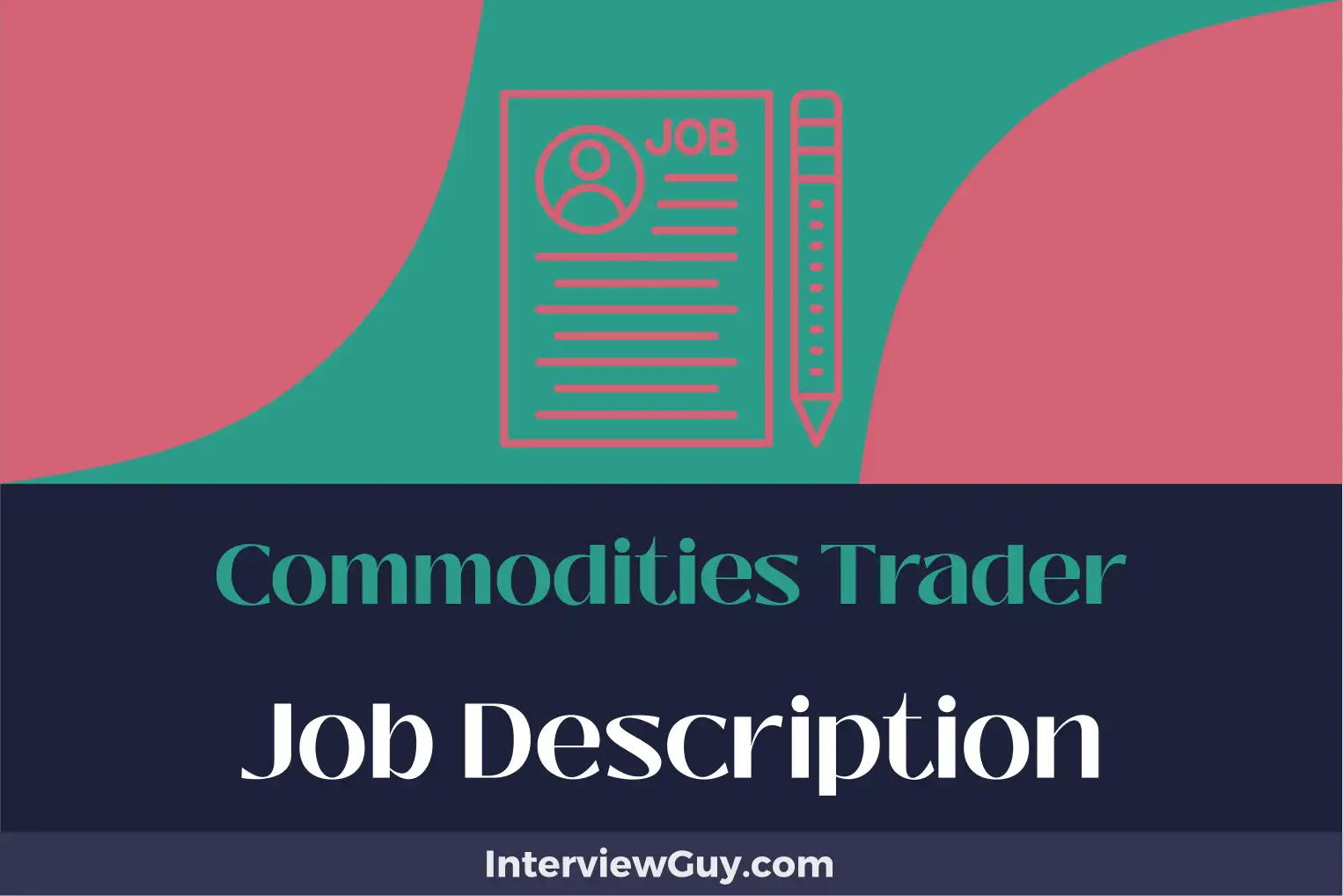Commodities Trader Job Description [Updated for 2026]

In the globalized economy, the focus on commodities traders has never been stronger.
Markets are continuously evolving, and with each fluctuation, the demand for knowledgeable individuals who can navigate, influence, and safeguard our commodities trading landscape is on the rise.
But let’s delve deeper: What’s truly expected from a commodities trader?
Whether you are:
- A job seeker trying to understand the core of this role,
- A hiring manager outlining the perfect candidate,
- Or simply fascinated by the complexities of commodities trading,
You’re in the right place.
Today, we present a versatile commodities trader job description template, designed for effortless posting on job boards or career sites.
Let’s dive right in.
Commodities Trader Duties and Responsibilities
Commodities Traders perform crucial tasks related to buying and selling commodities, such as grains, oil, precious metals, or livestock on a commodities exchange.
They require strategic planning, in-depth market research, and sound decision-making skills.
The duties and responsibilities of Commodities Traders include:
- Research and analyze current global market trends
- Develop and implement trading strategies based on the market analysis
- Buy and sell commodities on the commodities exchange
- Monitor the prices of commodities and economic trends that could influence them
- Negotiate and execute contracts with suppliers and customers
- Manage relationships with clients and provide them with market information
- Manage financial risk through hedging and other strategies
- Prepare financial reports and forecasts
- Ensure compliance with industry regulations and standards
Commodities Trader Job Description Template
Job Brief
We are seeking a detail-oriented and strategic Commodities Trader to join our team.
You will be responsible for analyzing market trends, buying and selling commodity products, and managing relationships with clients and suppliers.
Our ideal candidate has a strong understanding of commodity markets, excellent analytical skills, and the ability to make informed decisions quickly.
Ultimately, your role as a Commodities Trader is to generate profit while minimizing risk, ensuring that our company remains competitive and profitable in the commodities market.
Responsibilities
- Analyze market trends and conditions to guide the buying and selling of commodities
- Develop and manage relationships with suppliers and clients
- Negotiate purchase and sales contracts with suppliers and clients
- Monitor and forecast the performance of commodity investments
- Manage commodity trading positions to mitigate risk and maximize profit
- Stay informed about changes in the commodities market and regulatory environment
- Prepare reports detailing commodity trading activities and profits
Qualifications
- Proven work experience as a Commodities Trader
- Strong knowledge of commodity markets and trading practices
- Excellent negotiation and communication skills
- Ability to analyze market trends and make informed decisions quickly
- Proficiency in financial analysis and risk assessment
- Bachelor’s degree in Finance, Economics, or a related field
Benefits
- 401(k) with company match
- Health, dental, and vision insurance
- Profit sharing
- Paid time off and holidays
- Professional development and continued education opportunities
Additional Information
- Job Title: Commodities Trader
- Work Environment: Office setting with a fast-paced, high-pressure environment. Must be able to make quick decisions and handle stress.
- Reporting Structure: Reports to the Director of Trading or Head Trader.
- Salary: Salary is based upon candidate experience and qualifications, as well as market and business considerations.
- Pay Range: $92,000 minimum to $190,000 maximum, not including potential bonuses based on performance.
- Location: [City, State] (specify the location or indicate if remote)
- Employment Type: Full-time
- Equal Opportunity Statement: We are an equal opportunity employer and value diversity at our company. We do not discriminate on the basis of race, religion, color, national origin, gender, sexual orientation, age, marital status, veteran status, or disability status.
- Application Instructions: Please submit your resume and a cover letter outlining your qualifications and experience to [email address or application portal].
What Does a Commodities Trader Do?
Commodities Traders typically work for commodity brokerage firms, trading companies, or they can also be self-employed individuals operating from anywhere in the world with a good internet connection.
Their primary responsibility is to buy and sell commodities on behalf of their clients.
These commodities can range from agricultural products like wheat and coffee, to metals such as gold and silver, and energy products like oil and natural gas.
They are charged with understanding and predicting market trends using a variety of analytical tools.
They then use this knowledge to speculate on future price movements to make profitable trades.
Commodities Traders often work in a fast-paced environment, as they need to make quick decisions based on the fluctuating market conditions.
They also need to maintain excellent communication with their clients, providing them with regular updates about their investments, and also discussing their risk tolerance and investment goals.
Their job also involves managing relationships with commodity suppliers, understanding the production and delivery process, and negotiating prices and delivery terms.
Furthermore, they must keep themselves updated with the latest industry news, regulations, and developments that might affect the commodity market.
Commodities Trader Qualifications and Skills
A proficient Commodities Trader should possess the following qualifications and skills:
- Strong mathematical and analytical skills to interpret complex data and market trends.
- Good understanding and knowledge of commodities markets, trading procedures, and financial analysis.
- Exceptional decision-making skills to make quick and sound decisions based on market changes.
- Excellent communication skills to effectively negotiate deals, liaise with clients, and communicate market trends to stakeholders.
- High level of risk management skills to minimize potential losses and identify profitable investment opportunities.
- Advanced knowledge of financial software and platforms used in commodities trading.
- Ability to work under pressure and make quick decisions in fast-paced, high-stress environments.
- Strong organizational and multitasking skills to manage multiple portfolios and transactions simultaneously.
Commodities Trader Experience Requirements
Entry-level Commodities Traders may come from a financial background, often having completed a degree in finance, economics, or a related field.
Some may have 1 to 2 years of experience, usually acquired through internships or part-time roles in investment banks, hedge funds, or commodity trading companies.
These professionals can also gain on-the-job experience in roles such as Financial Analyst, Investment Associate, or other finance-related roles.
A strong understanding of financial markets, excellent quantitative and analytical skills, along with a keen interest in commodities markets are crucial at this stage.
Candidates with 3 to 5 years of experience have usually developed their skills and knowledge in entry-level roles and have a good understanding of the dynamics of global commodities markets.
They also have experience in creating and executing trading strategies and have good risk management skills.
Those with more than 5 years of experience are often well-versed in all aspects of commodities trading.
They may have proven track records of profitable trading and may have experience managing large portfolios.
They are likely capable of making high-pressure decisions and have strong negotiation skills.
At this level, they may be ready for a senior or managerial role, leading a team of traders or overseeing strategic trading decisions.
Commodities Trader Education and Training Requirements
Commodities Traders typically have a bachelor’s degree in finance, economics, business or a related field.
They require a firm understanding of financial markets and trading principles.
Knowledge in commodities such as grains, oil, metals and others is also essential.
Most positions require experience in a trading environment, which can be obtained through internships or entry-level positions.
A master’s degree in business administration (MBA) or finance can be beneficial and may provide a competitive advantage.
Some companies might prefer candidates with these advanced degrees.
Certifications such as the Chartered Financial Analyst (CFA) or the Series 3 National Commodity Futures Examination can help traders show their competency and dedication in the field.
To trade commodities, individuals must pass the Series 3 National Commodity Futures Examination to get licensed.
Further, a membership with the National Futures Association is often required.
Continuing education is important in this rapidly changing field.
Traders often attend seminars and training courses to stay updated on market trends and new trading strategies.
Commodities Trader Salary Expectations
A Commodities Trader can expect to earn an average salary of $78,570 (USD) per year.
However, this can vary significantly based on factors such as experience level, specific commodities traded, location, and the firm for which they work.
High performers may also receive substantial bonuses, which can significantly increase their overall compensation.
Commodities Trader Job Description FAQs
What skills does a Commodities Trader need?
Commodities Traders should have strong analytical and numerical skills to understand market trends and make informed trading decisions.
They should also possess excellent communication and interpersonal skills to build strong relationships with clients and brokers.
Knowledge of the specific commodity markets they are involved in is crucial, as is the ability to work under pressure and make quick decisions.
Do Commodities Traders need a degree?
While a degree is not strictly necessary, most Commodities Traders have a degree in fields such as economics, finance, business, or a related field.
Additionally, having certifications such as the Series 3 License from the National Futures Association can be beneficial.
Experience in trading and understanding of commodity markets is often more important than formal education.
What should you look for in a Commodities Trader resume?
When examining a Commodities Trader’s resume, look for experience in trading and knowledge of specific commodity markets.
A strong background in economics, finance, or business is a plus.
Skills such as analytical thinking, decision-making, and communication should be evident.
Also, look for evidence of the ability to work under pressure and make quick decisions.
What qualities make a good Commodities Trader?
A good Commodities Trader is decisive, has a keen attention to detail, and can quickly analyze complex market data to make informed trading decisions.
They should also have a deep understanding of global markets and economics.
Being able to stay calm under pressure is crucial, as the markets can change rapidly.
Good interpersonal skills are also important, as building and maintaining relationships with clients and brokers is a key part of the job.
Is it difficult to hire Commodities Traders?
Hiring Commodities Traders can be challenging due to the specialist skills and knowledge required for the role.
You need to ensure that candidates not only have the necessary trading skills and knowledge of commodity markets but also the ability to work well under pressure and make quick decisions.
Offering competitive salaries and opportunities for advancement can help attract top talent.
Conclusion
So there you have it.
Today, we’ve delved into the intricate world of what it means to be a commodities trader.
Surprising, isn’t it?
It’s not just about buying and selling goods.
It’s about navigating the economic seas, one trade at a time.
With our comprehensive commodities trader job description template and real-world examples, you’re ready to take the plunge.
But why stop there?
Venture further with our job description generator. It’s your ultimate resource for creating meticulously detailed job listings or honing your resume to near-perfection.
Remember:
Every trade is a stepping stone to global economic growth.
Let’s navigate this financial sea. Together.
How to Become a Commodities Trader (Complete Guide)
The Office Obituary: The Most Hated Jobs That Workers Avoid
Stressful Jobs Exposed: The Realities That Will Shock You!
The Pleasure Principle: Careers That Are Enjoyable and Rewarding



![Digital Painter Job Description [Updated for 2026]](https://interviewguy.com/wp-content/uploads/2024/05/digital-painter-job-description-768x512.webp)
![Public Relations Intern Job Description [Updated for 2026]](https://interviewguy.com/wp-content/uploads/2024/02/public-relations-intern-job-description-768x512.webp)
![Table Games Dealer Job Description [Updated for 2026]](https://interviewguy.com/wp-content/uploads/2024/02/table-games-dealer-job-description-768x512.webp)
